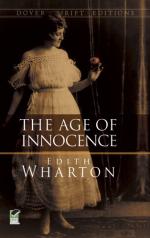It was only half-past eight, after all, when he rang the bell under the wisteria; not as late as he had intended by half an hour—but a singular restlessness had driven him to her door. He reflected, however, that Mrs. Struthers’s Sunday evenings were not like a ball, and that her guests, as if to minimise their delinquency, usually went early.
The one thing he had not counted on, in entering Madame Olenska’s hall, was to find hats and overcoats there. Why had she bidden him to come early if she was having people to dine? On a closer inspection of the garments besides which Nastasia was laying his own, his resentment gave way to curiosity. The overcoats were in fact the very strangest he had ever seen under a polite roof; and it took but a glance to assure himself that neither of them belonged to Julius Beaufort. One was a shaggy yellow ulster of “reach-me-down” cut, the other a very old and rusty cloak with a cape—something like what the French called a “Macfarlane.” This garment, which appeared to be made for a person of prodigious size, had evidently seen long and hard wear, and its greenish-black folds gave out a moist sawdusty smell suggestive of prolonged sessions against bar-room walls. On it lay a ragged grey scarf and an odd felt hat of semiclerical shape.
Archer raised his eyebrows enquiringly at Nastasia, who raised hers in return with a fatalistic “Gia!” as she threw open the drawing-room door.
The young man saw at once that his hostess was not in the room; then, with surprise, he discovered another lady standing by the fire. This lady, who was long, lean and loosely put together, was clad in raiment intricately looped and fringed, with plaids and stripes and bands of plain colour disposed in a design to which the clue seemed missing. Her hair, which had tried to turn white and only succeeded in fading, was surmounted by a Spanish comb and black lace scarf, and silk mittens, visibly darned, covered her rheumatic hands.
Beside her, in a cloud of cigar-smoke, stood the owners of the two overcoats, both in morning clothes that they had evidently not taken off since morning. In one of the two, Archer, to his surprise, recognised Ned Winsett; the other and older, who was unknown to him, and whose gigantic frame declared him to be the wearer of the “Macfarlane,” had a feebly leonine head with crumpled grey hair, and moved his arms with large pawing gestures, as though he were distributing lay blessings to a kneeling multitude.
These three persons stood together on the hearth-rug, their eyes fixed on an extraordinarily large bouquet of crimson roses, with a knot of purple pansies at their base, that lay on the sofa where Madame Olenska usually sat.
“What they must have cost at this season—though of course it’s the sentiment one cares about!” the lady was saying in a sighing staccato as Archer came in.
The three turned with surprise at his appearance, and the lady, advancing, held out her hand.




